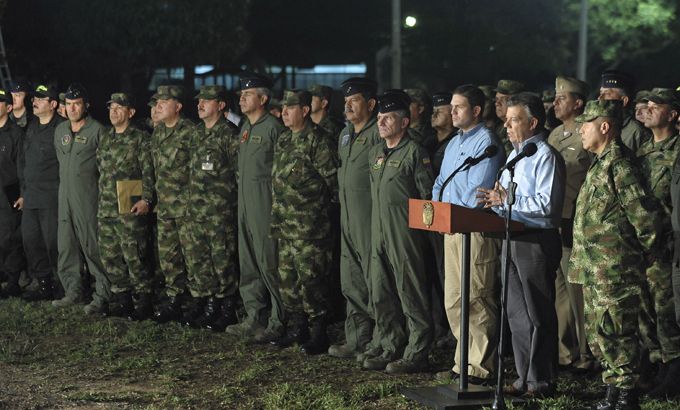Colombia rules out ceasefire with FARC
President says military will intensify operation against rebels ahead of peace talks in October.

Colombia’s president has rejected a proposal from the country’s main leftist rebel movement to observe a ceasefire during peace talks that are due to begin next month in Norway.
Leaders of the Revolutionary Armed Forces of Colombia, or FARC, said during a news conference in Cuba on Thursday that the first item on their negotiators’ agenda would be to propose a truce in the decades-long conflict that has killed tens of thousands of people.
Hours later, however, Colombian President Juan Manuel Santos said that would not happen.
He said the Colombian military and police had been instructed to intensify offensive actions against the rebels.
“There’s not going to be any ceasefire. We will not give anything until we get the final agreement, and I want to make that very clear,” the president told reporters at a military base in central Colombia.
Santos, who spoke after meeting with more than 100 generals and colonels, did not respond to questions.
There was no immediate comment from FARC officials.
Incarcerated negotiator
Earlier in the day, rebel officials had raised the idea of a ceasefire during a meeting with journalists in Havana to discuss FARC’s plans for the peace talks.
“We will propose a cease-fire the moment we sit down at the table,” said Mauricio Jaramillo, a spokesman and top FARC leader.
Before Santos rejected that idea, he said during an interview with Colombia’s W Radio on Thursday that a lasting peace could be achieved if both sides truly have the will.
“Making peace requires more sacrifice, more risk, but at the end the rewards are much higher,” Santos said.
FARC said that the talks are scheduled to begin on October 8 in Oslo. It also named three of its negotiators, including a high-ranking guerrilla fighter who is currently imprisoned in the US.
Jaramillo said two of the negotiators will be Ivan Marquez, a participant in past peace talks and a member of the FARC’s six-person ruling secretariat, and Jose Santrich, a second-tier leader.
The rebels said they want the third to be Ricardo Palmera, alias “Simon Trinidad”, a high-ranking FARC member and former peace negotiator who was extradited to the US in 2005.
He is serving a 60-year prison term on hostage-taking conspiracy charges for the kidnapping of three Americans in Colombia.
More negotiators will be announced later, Jaramillo said, speaking a day after the Colombian government named its five delegates to the talks.
Santos did not directly address FARC’s naming of Trinidad as a negotiator, but he seemed to refer to it when he said the government agreed to talks that are “serious, dignified, realistic and effective”.
“And those last two words – realistic and effective – are very connected,” he said. “If we hear proposals that are not realistic, then the process is not going to be effective.”
FARC chief speaks
FARC also played a video statement from their chief, Timoleon Jimenez, who goes by the nom de guerre “Timochenko”.
“We have never been stronger or more united,” Jimenez said. “They are completely mistaken, those who try to see weakness in our tireless efforts for peace.”
The Norwegian, Venezuelan and Chilean ambassadors to Cuba were at the convention hall representing their countries, which along with Cuba are facilitating the peace talks.
The talks in Norway will be the first attempt in a decade to reach a negotiated end to an armed conflict that began in 1964.
The rebel army draws its roots from anger among landless peasants in a country with a huge divide between rich and poor.
The last peace talks, in 2002, fell apart when the government concluded that the guerrillas were regrouping in a vast demilitarised zone it created and where the talks were held.